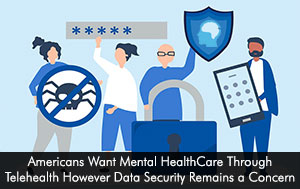The COVID-19 pandemic outbreak led to an increase in mental health struggles in people due to self-isolation, irregular sources of income, and a disruption in social life. A survey conducted by a cybersecurity firm CynergisTek revealed that about 46% of Americans would use the telehealth platform for therapy sessions with their mental health care provider.
Millennials and females are more willing to receive remote therapy sessions and telehealth solutions for anxiety and depression treatment. Telemedicine EMR software has opened up flexible options for mental health patients to receive timely diagnosis and treatment of underlying mental conditions. During these trying times, access to mental health via telehealth is crucial for patients however providers must use security measures to protect sensitive behavioral health data of patients.
Cybersecurity threats
It was revealed that nearly one in two Americans are concerned about privacy breaches of their mental health data that is shared on the digital platform. Millennials are prone to using telemedicine solutions however almost 50% of them are worried about their confidential data being hacked and breached. As telehealth adaptation rates are booming security concerns are big and hackers are in the mainstream finding opportunities to steal private mental health data. A recent report revealed that the number of attacks on telehealth vendors has increased drastically showing that technology is vulnerable and always exposed to cybersecurity threats.
How can digital healthcare improve data security and privacy?
Healthcare companies and telemedicine software vendors can embrace the following strategies to up security and protection of mental health data.
- Cybersecurity training – All employees should be trained for cybersecurity and these skills should be updated to keep up with the latest security policies. Strong passwords should be implemented and regular backups will help to keep protection strong.
- Protection of mobile devices – As more and more behavioral health care providers use mobile devices to connect with their patients for therapy sessions encryption methods must be used.
- Firewall – A firewall should be used for anything that is connected with the internet to keep the security of data and protect against hackers.
- Installation of antivirus software – By installing an antivirus software patient information can be protected and maintains round-the-clock security measures.
Conclusion
The increased access to mental health care providers via telehealth improves patient outcome levels and can receive refills on time. Mental health patients can benefit from virtual sessions and counseling. Digital appointments are more convenient especially for those patients who struggle with mental health issues like anxiety and depression. Online counseling is as good as visiting your mental health care provider in the clinic, by prioritizing the security of personal data Americans can greatly benefit from the telehealth platform to receive prompt diagnosis and treatment.







